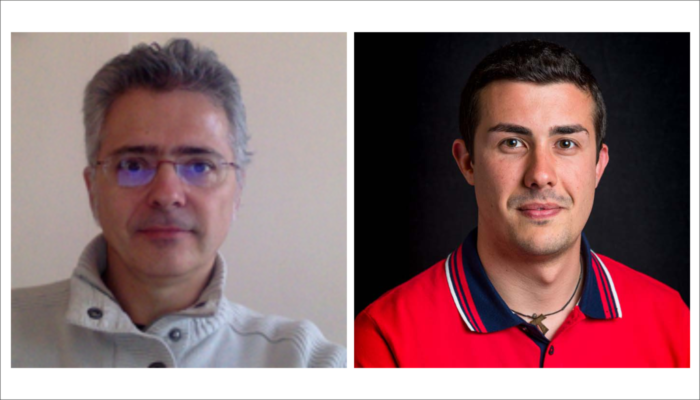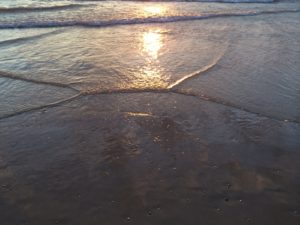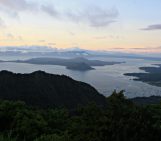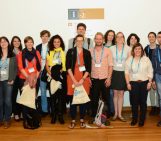
Hello Stéphane and Tommaso, thank you for speaking with us today – could you briefly introduce yourselves?
Stéphane Vannitsem
Okay, so my name is Stéphane Vannitsem, and I am a researcher at the Royal Meteorological Institute of Belgium, in Brussels, and I’ve recently become head of the Meteorological and Climatological Information Service. I’m also a lecturer at the Free University of Brussels and I’m President of the Nonlinear Processes Division until April 2021.
Tommaso Alberti
My name is Tommaso Alberti, and I’m a researcher at the Italian National Institute for Astrophysics. My research activities are based on dynamical systems and chaotic approaches to space and geosciences and I’m the ECS (Early Career Scientist) Representative of the Nonlinear Processes Division.
Can you tell us a little bit about what is involved in being the Division President and the Early Career Scientist Rep for Nonlinear Processes?
Stéphane
It is a very interesting position, because we are at the interface between the Nonlinear Processes community and the Council of the European Geosciences Union. So we represent our community, which is a really nice way to help them. And also, of course, we get to organize the different activities within the community, including for the General Assembly and EGU journals and things like that. I’ve learned a lot on the functioning of the EGU in this position!
Tommaso
As the ECS representative, I can say that it involves a lot of energy! As ECS, we have the opportunity to learn a lot of from EGU as an organisation. And also we do a lot of things for early careers researchers! So for me, this means coordinating activities like: short courses, managing the blog, and using social media. Recently, we launched a new series in our blogs, the Nonlinear Processes paper of the month, so it is really busy, but it is a real pleasure to do this for not only ECS but for our whole community.
Stéphane
And I have to say Tommaso is doing a really good job in this position!
Many of the EGU divisions will be familiar to people, but Nonlinear Processes is a very enigmatic name, can you explain what Nonlinear Processes in Geoscience are, and the kind of research that is included in your Division?
Stéphane
So if we start with the most basic, a linear relationship is the linear link between an input and an output, where the output is proportional to the input. A nonlinear process is something which is not linear, which includes a lot of processes in nature. To give you an example, there are equations that are used to describe the dynamics of fluids in the atmosphere, the ocean, even inside in the planet! All these fluids have a common property, they all have some nonlinear terms in equations used to calculate their behaviour, such as products between variables. This characteristic is present in the majority of processes throughout geosciences.

This cloud pattern indicates turbulence in the troposphere. (Imaggeo image Kelvin Helmholtz instabilities at the tropopause. Credit: Peter Hoor)
Tommaso
Yes, in fact last year we discussed the name of our Division as some people felt that it was too negative, ‘nonlinear’. But it’s not a negative name, because all processes in nature are nonlinear. Think about when you are on an airplane and the turbulence light goes on. Turbulence is a nonlinear process because what we call turbulence includes a feature called a ‘Richardson cascade’, which is an atmospheric vortex that breaks down. This procedure is not linear, because the vortex will form different sizes, scales and durations. This is a nonlinear process, you encounter them every day!
Stéphane
There is another very current example: pandemic dynamics. This is a really classic nonlinear process. Often these kinds of dynamics start with exponential growth, which is represented by a linear term in the dynamical equations. Now at some point, either the propagation of the virus has reached most of the population, or you may say ‘okay, let’s lockdown people at home so the virus will not propagate anymore’. The transmission of the virus then becomes limited and saturated, and this is nicely represented by a nonlinear term in the equations.

Nonlinear processes are all around us! (Imaggeo image, Mach Stem in the Near Shore Zone. Credit: Marek Stastna)
The variety of subjects we cover is reflected in the different subdivisions of the Nonlinear Processes Division. We have, of course, mathematics and dynamical equations, and stability, studying predictability and data assimilation, stochastic processes, scaling and turbulence. We have also nonlinear waves, which is where you study ‘rogue waves’ for example.
Tommaso
Also there is big data.
Stéphane
Exactly, big data and machine learning, which are based on nonlinear approaches in fact. So, what this means is that Nonlinear Processes really is an interdisciplinary Division. We study a broad range of subjects that are relevant to all the other divisions of the EGU.
Tommaso
I agree, it is important to recognize that the Nonlinear Processes Division is interdisciplinary and transdisciplinary, because we cover a lot of topics that also sit within also other EGU Divisions.
2020 has been a very challenging year for everyone for a range of reasons. What are you most looking forward to in 2021?
Stéphane
Well, for me, it’s just to be able to meet people and to discuss things, over a beer or a cup of tea or whatever, just to share things with people. Meeting up again in an informal way is really important.
Tommaso
For me, I would like to discover that our online conference vEGU21 is not so much worse than meeting in person. But obviously, I also hope to be less visual and more personal again. For example, I started collaborating with Stéphane recently, but I haven’t yet been to Belgium to discuss anything with him! I hope to be able to do this next year.
Finally, is there anything coming up soon that you would like to let our readers know about?
Stéphane
Something really important for the Nonlinear Processes Division is that we are organising lots of short courses for vEGU21 and the short courses are really good. We have run many courses in the past at the General Assembly, to help us to share the different techniques we are developing or using. So I want to encourage everyone to come to our short courses! Also we have our EGU Journal, Nonlinear Processes in Geophysics, which is a really important journal for our community. It’s not a big journal and the impact factor is not the highest, but it is a place to publish really good quality, open access papers – so I would like to encourage people to submit.
Tommaso
Also we have recently organised our first series of Campfires, which are special webinars run by the Nonlinear Processes Division, providing a perspective on climate sciences. We finished our series for this year, which had great attendance and speakers, and plan our next series to start again in 2021, between January and March. Another thing we are planning right now is to form a Nonlinear Processes Division team to help with any kind of activity which is related to the Division. So we will be sending out a call to invite people to take part next year.
Stéphane
I also have a comment about the Campfires; they are really great. We have this group of Early Career Scientists from Nonlinear Processes who are doing such a nice job. I like the way they have planned it and invited famous researchers from around the world to take part – it is amazing.
Tommaso
Thanks Stéphane!
And thank you to you both for speaking with us today! More information about the Nonlinear Processes Division can be found here.
Interview by Hazel Gibson, EGU Communications Officer.




